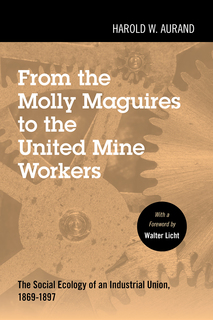From the Molly Maguires to the United Mine Workers
The Social Ecology of an Industrial Union, 1869-1897
With a Foreword by Walter Licht
Throughout the late nineteenth century the hard coal industry was a major employer in Pennsylvania. The Commonwealth’s anthracite regions also played an important role in the economic development of the nation. Anthracite stimulated many pioneering developments in American railroading and provided important fuel to the iron industry. The hard-coal regions were among the first areas in Pennsylvania to yield to corporate domination. Yet their history, notably between the well-documented "Molly Maguires" and the coal strike of 1902, was largely unexplored.
Although the area can be placed within the mainstream of American history, the anthracite regions developed a unique identity, the development of which can be found by studying the largest group in the area, the mine workers, and their problems between 1869 and 1897. Aurand documents and analyzes the problems facing mine workers, the resulting collective approach to addressing them, and the role of labor in the formation of a laboring class identity.
Table of Contents
Metadata
- isbn9781439917527
- publisherTemple University Press
- publisher placePhiladelphia, PA
- restrictionsCC-BY-NC-ND
- rightsCopyright © 1971 by Temple University—Of The Commonwealth System of Higher Education
First published 1971. Reissued 2018.


